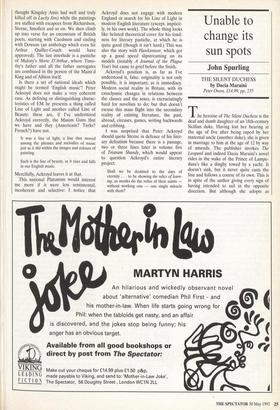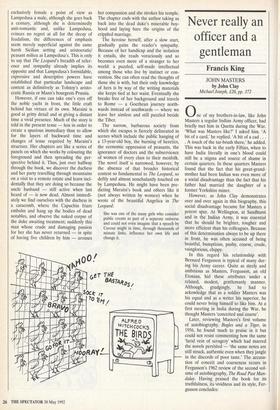Unable to change its sun spots
John Spurling
THE SILENT DUCHESS by Dacia Maraini Peter Owen, f14.99, pp. 235 The heroine of The Silent Duchess is the deaf and dumb daughter of an 18th-century Sicilian duke. Having lost her hearing at the age of five after being raped by her maternal uncle (another duke), she is given in marriage to him at the age of 12 by way of amends. The publisher invokes The Leopard and indeed Dacia Maraini's novel rides in the wake of the Prince of Lampe- dusa's like a dinghy towed by a yacht. It doesn't sink, but it never quite casts the line and follows a course of its own. This is in spite of the author giving every sign of having intended to sail in the opposite direction. But although she adopts as exclusively female a point of view as Lampedusa a male, although she goes back a century, although she is determinedly anti-romantic and, unlike Lampedusa, evinces no regret at all for the decay of feudalism, the differences of emphasis seem merely superficial against the same harsh Sicilian setting and aristocratic/ peasant milieu as Lampedusa's. This is only to say that The Leopard's breadth of refer- ence and sympathy already implies its opposite and that Lampedusa's formidable, expressive and descriptive powers have established that particular landscape and context as definitively as Tolstoy's aristo- cratic Russia or Mann's bourgeois Prussia.
However, if one can take one's eyes off the noble yacht in front, the little craft behind has virtues of its own. Maraini is good at gritty detail and at giving a distant time a vivid presence. Much of the story is told in the present tense — less in order to create a spurious immediacy than to allow for the layers of backward time and changes of tense required by Maraini's structure. Her chapters are like a series of panels on which she works by colouring the foreground and then spreading the per- spective behind it. Thus, just over halfway through the book, we discover the duchess and her party travelling through mountains on a visit to a remote estate and learn inci- dentally that they are doing so because the uncle husband — still active when last heard of — is now dead. Almost immedi- ately we find ourselves with the duchess in a catacomb, where the Capuchin friars embalm and hang up the bodies of dead notables, and observe the naked corpse of the duke awaiting treatment; suddenly this man whose crude and damaging passion for her she has never returned — in spite of having five children by him — arouses her compassion and she strokes his temple. The chapter ends with the author taking us back into the dead duke's miserable boy- hood and laying bare the origins of the crippled marriage.
The heroine herself, after a slow start, gradually gains the reader's sympathy. Because of her handicap and the isolation it entails, she reads voraciously and so becomes even more of a stranger to her world: a puzzled, self-made intellectual among those who live by instinct or con- vention. She can often read the thoughts of those she is with, but their only knowledge of hers is by way of the writing materials she keeps tied at her waist. Eventually she breaks free of her background and travels to Rome — a Goethean journey north- wards instead of southwards — where we leave her aimless and still puzzled beside the Tiber.
The narrow, barbarous society from which she escapes is fiercely delineated in scenes which include the public hanging of a 13-year-old boy, the burning of heretics, the economic oppression of peasants, the ignorance of doctors and the subservience of women of every class to their menfolk. The novel itself is narrowed, however, by the absence of that broader historical context so fundamental to The Leopard, so deftly and almost nonchalantly touched on by Lampedusa. He might have been pre- dicting Maraini's book and others like it (not always written by women) when he wrote of the beautiful Angelica in The Leopard:
She was one of the many girls who consider public events as part of a separate universe and could not even imagine that a speech by Cavour might in time, through thousands of minute links, influence her own life and change it.

















































 Previous page
Previous page